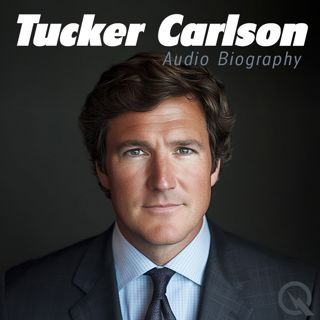
Tucker and Iran
Former Fox News host Tucker Carlson strongly criticized two Republican senators for their social media statements, which seemed to advocate for the United States to launch an offensive against Iran. This call for action came in response to a drone strike in Jordan, which tragically resulted in the death of three U.S. troops. Carlson, known for his outspoken views, expressed disapproval of the senators' stance, suggesting that their comments were provocative and potentially harmful. He argued that such rhetoric could escalate tensions and lead to more significant conflict, emphasizing the need for cautious and measured responses in international affairs, especially in situations involving potential military action. Carlson's critique highlights the complex and often contentious nature of political discourse surrounding foreign policy and military engagement.Carlson's critique goes beyond mere disagreement; it underscores a deeper concern about the implications of aggressive foreign policy. By challenging the senators' call for retaliation against Iran, he brought attention to the potential consequences of such actions, including the risk of escalating hostilities into a larger, possibly uncontrollable, conflict. His commentary delves into the intricate balance required in international relations, especially in the volatile Middle East region. The situation in Jordan, involving the loss of American lives, is undeniably grave. However, Carlson emphasizes the importance of diplomatic strategy over immediate military action. He argues that a rush to retaliate could undermine long-term U.S. interests in the region and may lead to unintended repercussions, including the endangerment of more American lives.Furthermore, Carlson's statements reflect a broader debate within American politics about the role of the U.S. in international conflicts. This incident brings to the forefront questions about interventionism, the use of military force, and the complexities of geopolitical strategy. It highlights the divide not only between political parties but also within them, as opinions on foreign policy can vary greatly among members of the same party.In critiquing the Republican senators, Carlson perhaps also touches upon the theme of responsibility in political rhetoric. In an age where social media posts can have significant impact and reach, the need for careful and considered communication from public figures becomes increasingly important. His response serves as a reminder that words, especially those calling for military action, carry weight and can have real-world consequences.In conclusion, Tucker Carlson's strong response to the senators' social media posts is a reflection of the ongoing debate about the appropriate use of American military power and the responsibility of elected officials in shaping foreign policy. His critique highlights the need for careful deliberation in matters of international conflict and the potential risks of hasty decisions made in the heat of the moment.Thanks for listening to Quiet Please. Remember to like and share wherever you get your podcastsThis content was created in partnership and with the help of Artificial Intelligence AI
1 Helmi 20243min

Tucker Carlson and The Great Media Migration
The Great Digital Migration of TV's Biggest Stars A tectonic shift is happening in the media landscape as some of TV's most well-known personalities, like Don Lemon and Tucker Carlson, leave the warm embrace of mainstream outlets to strike out on their own in the digital and social media wilds. They are planting a flag in new digital terrain, chasing the siren song of creative freedom and direct connection with loyal followers. Lemon is the latest boldface name to make the leap, launching "The Don Lemon Show" on X as part of a broader vision to build his own media empire. He joins conservative firebrand Tucker Carlson, who is leveraging the platform for similar entrepreneurial goals after his controversial tenure at Fox News. They want full control and see social platforms like X as the new frontier to amplify their signature voices without network filters. And Lemon and Carlson are not alone in this digital manifest destiny. Former Hawaii Congresswoman Tulsi Gabbard and veteran sportscaster Jim Rome are also setting up shop on X with new shows. The common thread is personalities seeing their media futures increasingly decentralized from traditional TV and fueled instead by the intimacy and loyalty of niche digital audiences. Megyn Kelly found new life on SiriusXM after scorched earth exits from both Fox and NBC. Dan Harris left ABC News to launch a wellness company. The appeal is speaking directly to fans, though the economics remain daunting. As one executive put it: "There are real reasons why no traditional news star has decided to make the jump to digital — without being pushed." Building a sustainable business is hard, but the potential upside has stars strapping on their pioneer spirits. The digital frontier has even bred its own wave of native stars showing the power of speaking to narrow audiences at scale. Conan O'Brien sold his podcast company to SiriusXM for $150 million. Former NFL player Pat McAfee turned a grassroots YouTube show into a $17 million licensing bonanza at ESPN. In many ways, they blazed the trail for personality-driven programming that thrives outside of TV's rigid sensibilities. And make no mistake, for all of TV news' bravado that the Carlsons and Lemons of the world will flame out without their platform and promotion, the writing may be on the wall. As Tim Hanlon of The Vertere Group notes: "Some media personalities are broadly appealing, and there are a whole bunch more who are more appealing to targeted audiences." In other words, niche is the new primetime. It's exciting but uncertain terrain. Don Lemon always had grander ambitions than CNN's standards would allow. He now has the opportunity to fully speak his mind and go directly to his most ardent supporters. Of course that comes with the catch of pulling audiences solely from your fame instead of a big network push. But we now enter an age led by a vanguard of talent YEARNING to connect directly with audiences and establish their own brand ethos. It's a new media manifest destiny - the rules are slowly being rewritten as marquee names blaze their own trails in the digital wilderness. Anchors-turned-media moguls like Don Lemon and Tucker Carlson represent both the promise and risk of this new frontier. The old world of network television still holds major sway, but the winds of change are gathering momentum. As more stars decamp for direct fan engagement and creative liberty, they gamble with their careers while accelerating audience fragmentation. But with great risk can come great reward. Megyn Kelly found resurrection online after her NBC debacle. Dan Harris taps new purpose with his wellness startup. Though the road ahead remains rocky, their examples stoke continued migration from TV’s once-dominant hub. The Legacy outlets must now fight against a current of innovation threatening their celebrity foundation. Amid the churn lies the possibility for both talent and consumers alike. Unfettered ambition can overreach, but insurgent digital shows also widen choice. Tucker Carlson speaking against the liberal grain; Don Lemon firing from the progressive hip - their participation grows the marketplace. Savvy stars will learn financial sustainability; smart fans find added perspectives. In the end, screens matter less than the voices behind them. As TV’s familiar faces plant their flags across new digital divides, seismic change gives rise to risk and reward. With amplified freedom comes amplified responsibility. How talent stewards their direct access - whether with wisdom or recklessness - will shape this frontier’s ultimate destination. Their success may unleash even more migration. So while uncertainty still looms large, the collective lure of independence and no compromises breeds confident gambles. The gates are opening wider as both anchors and audiences embrace new normals. We are all pioneers now, mapping television’s crossroads while chasing fresh dreams. Manifest media destiny marches on. Thanks for listening to Quiet Please. Remember to like and share wherever you get your podcasts.This content was created in partnership and with the help of Artificial Intelligence AI
30 Tammi 20245min

Carlson In Canada
Picture this: Alberta, Canada, a land of vast prairies and proud conservatism. Now, imagine American talk show host Tucker Carlson, renowned for fiery rhetoric and eyebrow-raising opinions, descending upon its capital with a two-stop "liberation tour." What ensues is a whirlwind of political intrigue, cultural clashes, and a whole lot of rhetorical hot air.Carlson's visit, ostensibly motivated by Canadian Prime Minister Justin Trudeau's "autocratic" regime (news to most Canadians), comes on the heels of several international trips fueling speculation about his potential role in a hypothetical second Trump administration. But Carlson insists he's just a simple commentator, drawn to Canada's "endless firewood" and "bigger trout." Sure, why not.He arrives in Calgary to sold-out crowds, pockets lined with C$200 tickets and VIP lunch packages. His Alberta odyssey, however, doesn't lack controversy. Petitions circulate, demanding his Edmonton show be cancelled for promoting "hate speech, misinformation, and extremism." But hey, free speech and all that, right?Carlson's main target? Trudeau, of course. He paints the Prime Minister as a dull dictator in blackface, a caricature that Canadians may find more eye-roll-inducing than persuasive. Yet, his focus on Canada's medical assistance in dying (MAID) law strikes a sensitive chord. Conservatives see it as a slippery slope towards a "culture of death," while many others view it as a compassionate end-of-life option.Meanwhile, in Ottawa, Trudeau and his team huddle, strategizing how to handle a potential Trump 2.0. With the next election looming, the specter of MAGA influence looms large. Should they attack Carlson and his ilk as American interlopers or simply hope the Canadian electorate sees through the noise?This Alberta experiment presents a fascinating intersection of American populism and Canadian politics. It raises questions about the influence of foreign commentators, the potential impact of a Trump return on Canada's political landscape, and the challenges of navigating complex ethical issues like MAID.Will Carlson's Alberta tour change anything? Probably not. But it serves as a microcosm of larger political trends, a reminder that the world of soundbites and partisan battles often trumps nuanced, fact-based discussions. So, grab your popcorn (or maple syrup), because the show's just getting started.Thanks for listening to Quiet Please. Remember to like and share wherever you get your podcasts.This content was created in partnership and with the help of Artificial Intelligence AI
25 Tammi 20242min

Tucker Carlson - Audio Biography
Tucker Carlson: A Controversial Figure in the Landscape of American News Tucker Carlson, the name synonymous with provocative political commentary and high ratings, is a complex figure defying easy categorization. He's a conservative broadcaster, a cultural provocateur, and a media icon, wielding the megaphone of the popular "Tucker Carlson Tonight" on Fox News. His rise to stardom has been meteoric, but it's also been riddled with controversy, leaving audiences and critics alike scrambling to understand the man behind the microphone. From Journalism to Cable Giant: Born in San Francisco in 1969, Carlson's early life was steeped in privilege and intellectual curiosity. He attended elite boarding schools and graduated from Trinity College with a history degree. His journalistic career began with fact-checking at the conservative magazine Policy Review, followed by stints at various publications like The Weekly Standard and Esquire. It was his move to television, first on CNN and then MSNBC, that propelled him into the public eye. His outspoken conservative perspectives, delivered with a sardonic wit, garnered both fans and detractors. Breaking the Mold at Fox News: In 2009, Carlson landed at Fox News, initially hosting a daytime talk show. But it was his 2016 primetime slot that launched "Tucker Carlson Tonight" into the stratosphere. The show's format, a blend of monologue, interviews, and pre-recorded segments, resonated with a segment of the American audience hungry for a stark take on the news. Carlson's unapologetically conservative voice, his talent for framing issues in stark binaries, and his willingness to tackle controversial topics fueled the show's popularity. A Master of Controversy: Carlson's success cannot be separated from the controversy that shrouds him. His critics accuse him of spreading misinformation, stoking racial and cultural divisions, and promoting conspiracy theories. They point to his segments questioning climate change, promoting skepticism about the 2020 election, and his sympathy for white nationalist viewpoints. Supporters, on the other hand, see him as a fearless truth-teller, a lone voice challenging the liberal media establishment and defending traditional American values. Beyond the Show: Carlson's influence extends beyond "Tucker Carlson Tonight." He founded and currently serves as the editor-in-chief of The Daily Caller, a conservative news website. He's also a prolific author, with several books to his name. His social media presence is equally impactful, commanding a loyal following and generating viral content. Legacy and Implications: Tucker Carlson's legacy is still being written. His ascendance to the pinnacle of cable news reflects the changing media landscape and the growing prominence of conservative voices. His style has redefined political commentary, blurring the lines between news and opinion. Whether loved or loathed, there's no denying that Tucker Carlson has become a defining figure in contemporary American media, his voice shaping national conversations and influencing millions. Thanks for listening to Quiet Please. Remember to like and share wherever you get your podcasts.This content was created in partnership and with the help of Artificial Intelligence AI
27 Joulu 20233min





















